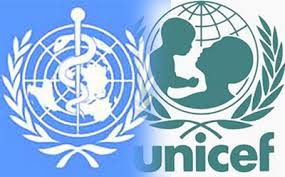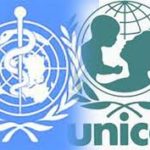By Asma’u Ahmad
Representatives of the World Health Organisation (WHO) and United Nations Children Fund (UNICEF) have expressed satisfaction over the implementation of the 70 million-euro European Union-sponsored health projects in Sokoto State.
UNICEF Chief of Health, Dr Sanjana Bhardwaj, who spoke during a field inspection exercise in Sokoto on Friday, said that the projects were progressing steadily in spite of some perceptible challenges facing immunisation, nutrition and other schemes.
Bhardwaj called on the benefiting communities to appreciate the importance of the programme, which was particularly targeted at improving their health conditions.
She urged families to take advantage of the improved health services and access the health facilities provided in the health projects, while considering the programme as their own.
Also speaking, Dr Andrew Mbewe, Head of Reproductive, Maternal, Newborn and Child Health, WHO, said that although the programme was about a year old, it had recorded appreciable progress, particularly in improving the health data storage system and streamlining the health registry.
He said that the Integrated Disease Surveillance and Response (IDSR) component of the programme had been established, while calling for the support of donor and government agencies in efforts to improve the documentation of vital health issues.
He said that the activity would facilitate the identification of diseases and the use of collated data in decision making and formulating appropriate policies.
Mbewe urged benefiting communities to use the health centres and ensure the vaccination of children against child killer diseases.
He said that in spite of some challenges facing the programme, its implementation had been smooth and in line with the set objectives.
Earlier, Mr Kurt Cornelis, the Minister Counsellor and Head of Cooperation, European Union Delegation to Nigeria and ECOWAS, said that the programme was aimed at straightening the communication channels in local government areas, primary health centres and ministries.
He said that the visit was to interact with key players and community leaders, as part of efforts to secure direct reactions to the progress and challenges in the implementation of the programme.
Cornelis said that appreciable progress had been made in the area of knowledge sharing and disease surveillance. He said that the overall exercise was aimed at strengthening the health system as a whole, adding that at present, the immunisation coverage and the reform of health information system had improved.
Cornelis, however, appealled to the government to improve its budgetary allocation to the health sector, while advising community members to use the health facilities and cooperate with health officials.
He condoled with the people of Gandi and Tabanni where gunmen attacked and killed over 40 people, pledging that the development partners would look into how to assist the Internally Displaced Persons (IDPs) in the IDPs camp.
He, however, commended the authorities for their efforts to assuage the plight of the displaced persons in the camp.





